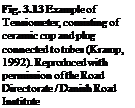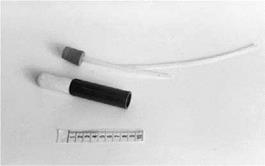Tensiometers
One of the most common devices for measuring suction is a tensiometer. A tensiometer consists of a fine porous ceramic cup connected by a tube to a vacuum
|
Technique/Sensor |
Suction component measured |
Measurement range (kPa) |
Equilibrium time |
Laboratory/Field |
|
Tensiometers |
Matric |
0-100 |
Several minutes |
Laboratory and field |
|
Axis translation techniques |
Matric |
0-1500 |
Several hours-days |
Laboratory |
|
Electrical/ thermal conductivity sensors |
Matric |
0-1500 |
Several hours-days |
Laboratory and field |
|
Contact filter paper method |
Matric |
0-10000 |
2-5 days |
Laboratory and field |
|
Non contact filter paper method |
Total |
1000-10000 |
2-14 days |
Laboratory and field |
|
Table 3.2 Summary of common laboratory and field techniques for measuring soil suction. Based on Lu & Likos (2004) and Rahardjo & Leong (2006) |
gauge (see Fig. 3.13). The entire device is filled with de-aired water. The porous tip is placed in intimate contact with the soil and the water flows through the porous cup (in or out) until the pressure inside the ceramic cup is in equilibrium with the pore water in the soil. The reading on the pressure measuring device, once corrected for the water column in the device, is the matric suction (Apul et al., 2002). The water pressure that can be measured by this method is limited to approximately -90 kPa, otherwise water will begin to boil inside the tensiometer (“cavitation”). Tensiometers have been found to provide the best measuring technique for low-range suction as they measure the pore pressures directly and respond promptly to pore water pressure changes (Rahardjo & Leong, 2006).
 |
 |
Lately, “high-capacity” tensiometers have been developed (e. g. Ridley & Burland, 1993; Guan& Fredlund, 1997; Tarantino andMongiovi, 2001). Whencou – pled with specialised operating procedures, for example, cyclic prepressurization techniques, they have been shown to be applicable for matric suction up to 1500 kPa. Comparisons with established measurement systems have shown high-capacity tensiometers to be relatively reliable and quite rapid in terms of response time.






Leave a reply